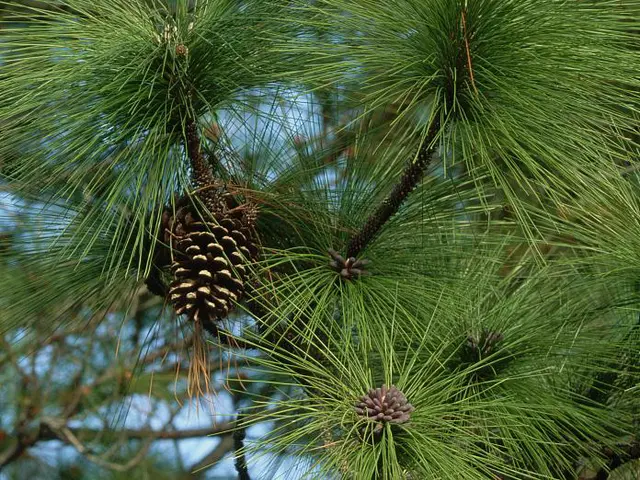Salem Al-Huwaili, a 46-year-old Syrian displaced man, climbs up a tall pine tree in a forest in the town of Kfar Hamam in the eastern side of southern Lebanon.
Nicknamed "the master," Al-Huwaili stares carefully at the branches of the tree before chasing pine cones and throwing them on the ground with a long hook.
Al-Huwaili told Xinhua that there are only few people who harvest pine cones because it is a dangerous and arduous profession that requires courage and experience, and falling down from the tree can be harmful, even lead to death.
Faisal Hammoud, another farmer, explained that harvest of pine cones is not easy as it requires six months at least.
Hammoud, who inherited from his father a 3,000-square-meter pine forest in Arqoub region in southern Lebanon, explained that after harvesting the pine cones, they get exposed to sunlight, followed by separating the grains from the cones.
However, pine farmers interviewed by Xinhua have noticed a drop in pine-cone production in the past few years.
Al-Huwaili, who has been working in this profession for 22 years, said that pine trees currently produce only 40 pine cones compared to 100 in the past.
"I believe that the decline of production is due to multiple diseases that hit the pine trees in light of the inability of farmers to access products needed to treat these diseases," he said.
Also, Fadi al-Khafaga, head of an agricultural association that deals with forest wealth, attributed the drop of production to diseases including the sandalwood worm, which leads to the sagging of the tree and its death.
Meanwhile, Youssef Fayad, head of al-Mari municipality, told Xinhua that he had informed the Ministry of Agriculture about diseases affecting pine trees while urging authorities to provide pesticides to fight against insects that harm the trees.
"As a result, the ministry and the Lebanese army cooperated in spraying forests with pesticides by using helicopters," he said.
For his part, Jalal Abu Omar, a 75-year-old farmer, said this season is very bad because the price of a kilogram of pine cones reached 200,000 Lebanese pounds (132 U.S. dollars according to the official price of the dollar) due to the scarcity of the product.
Another problem facing pine farming in Lebanon is competition by Turkish pine nuts' sold in the Lebanese market, said Adel Hamdan, head of an agricultural cooperative that cares for trees.
Hamdan called for protecting domestic production of pine cones by halting import of this product, noting that farmers have been suffering the difficult economic conditions in Lebanon, with the sharp decline in the value of the Lebanese pound against the U.S. dollar.
Lebanon produces around 600 tons of pine cones annually, according to statistics by the Ministry of Agriculture, but production fell to 300 tons yearly during the past five years.
Pine is used in preparing various dishes and desserts, and it contains many healthy nutrients that boost immunity.
 简体中文
简体中文

